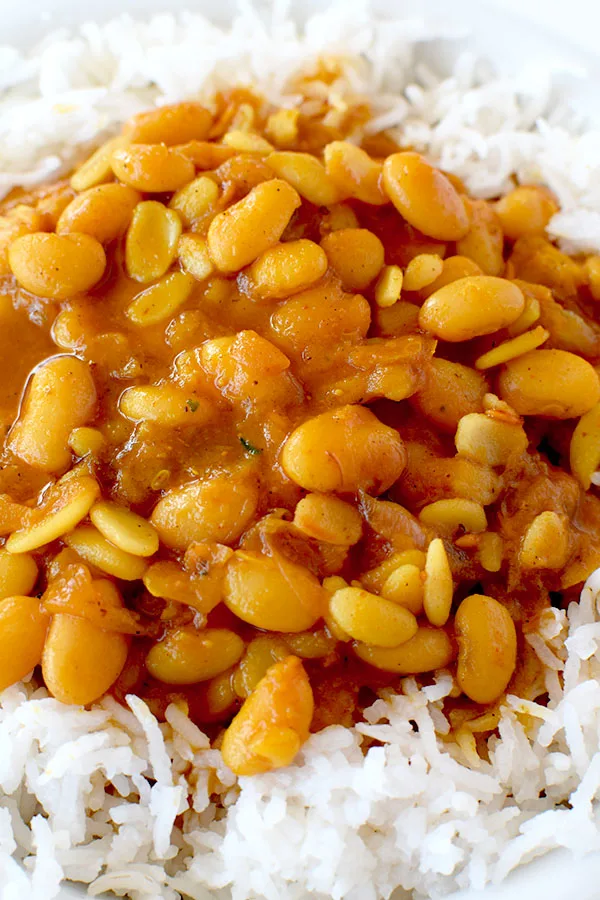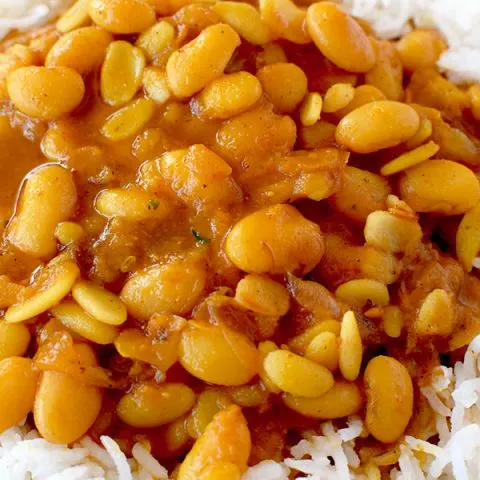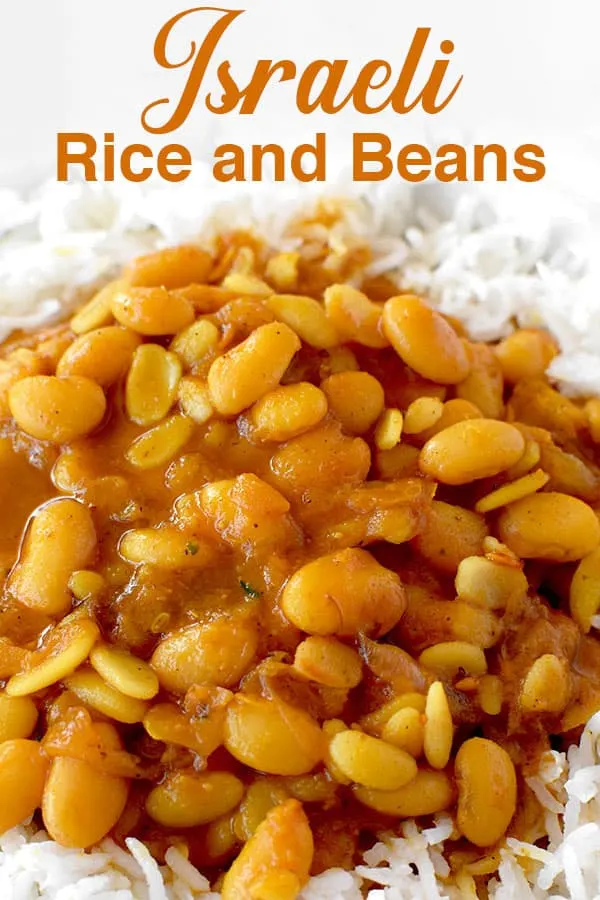Israeli rice and beans is a delicious savory dish flavored with cumin and sweet paprika. It can be eaten on its own or as a side to complement meat or chicken.

Israeli rice and beans was created by Sephardic Jews in the Old City of Jerusalem. Later, adopted by Jews across the country.
To this day it is still a common side dish made in Israeli homes including by my great aunt.
It is one of my favorite side dishes and I often eat it on it's own.
Every year on my birthday, my mom and I go out to eat, just the two of us. I look forward to the one on one time away from the business of life all year.
Before moving to Israel, the restaurant of choice was always Israeli and we'd always order the same thing: chicken shawarma with rice and beans.
Rice and beans is actually not something you'd see on the menu.
For reasons unknown to me, they only list bean soup, which is a less popular dish in Israel.
So, my Mom would ask for them to pour the soup over the rice.
I was always amazed by how much these beans enriched the whole meal.
To this day, Israeli rice and beans is one of my favorite foods!
You can serve it with regular rice, Israeli white rice, or Israeli Yellow Rice.
SORT BEANS
Sorting beans is a good way to make sure that there aren’t any pebbles mixed in. While I’ve yet to find any, my friend has. Better safe than sorry.
DO YOU NEED TO SOAK THE BEANS?
The short answer is, for this recipe, yes.
Not all beans need to be soaked. Smaller ones with thinner skins, like black beans, lentils, and black-eyed peas, can usually skip the soaking step.
At most, you’ll have a slightly longer cooking time.
Heftier beans like chickpeas, navy beans, pinto beans, and more, on the other hand, do need to be soaked.
You can sometimes get away with not soaking those beans, but not always.
The older they are, the more likely they will need to be soaked.
However, since we rarely know how old our dried beans are, soaking them is almost always a smart move.
FLOATING BEANS
It’s been held for centuries that floating beans are a sign that bugs may have burrowed a hole in it. I always remove floating beans.
Adding Salt
Salt not only adds flavor, but helps beans keep their shape. Bullion powder usually has plenty of salt so I just add a pinch extra.
I also generally believe in adding salt to the finished product or letting each person add their own salt.
As my friend Shosh says, it’s much easier to add salt than take it away.
DO YOU really NEED BAKING SODA?
Again, the short answer is yes. There are two reasons for this.
The first is that baking soda softens beans by creating an alkaline environment that helps speed the breakdown of pectin.
Pectin is used by beans and other plants to keep them strong.
Another reason is that areas with hard water are high in calcium and magnesium which slow and even prevent beans from softening.
Baking soda adjusts the pH level of the water, fixing this problem.
All you need is a pinch of baking soda for a pound of beans. Be careful about adding too much.
I once forgot to add the baking soda and the beans took longer to cook. When I remembered, I added it, but within a short amount of time, the beans became so soft really quickly that they ended up a paste.
Pressure Cooker
I love using my pressure cooker. It cuts the cooking time of whatever I'm making down drastically.
Also, if you don't release the pressure valve and let it decompress on it's own, you'll end up with a nicer end product.
I use a pressure cooker for Israeli bean soup, Israeli rice and beans, chicken soup, stews, and more with great results.
HOW TO STORE
When cool, place both rice and beans in separate containers or in an resealable airtight bags. Store in the fridge for 3 to 5 days.
HOW TO FREEZE
Let beans cool completely and place airtight container or a resealable freezer storage bag.
Store for up to 3 months. After that, they are still safe to eat but the quality begins to degrade.
It’s best to defrost overnight in the fridge before reheating. However, when I’m in a pinch I do defrost it on the counter.
REHEATING RICE
FROM THE FRIDGE
When reheating, place the rice in a pot, sprinkle a teaspoon of water over the top to help loosen stuck, dried grains, then place.
Heat over medium heat, stirring constantly to keep the grains moving, but be careful not to mash them.
FROM FREEZER
Frozen grains can be added directly to hot dishes like stir-fries. If you’re planning on eating it on its own, follow the steps above.
Israeli Rice and Beans

This rice and bean dish is a favorite in Israeli homes, and I always request it when I'm in an Israeli restaurant in New York.
Ingredients
Pre-soak
- 3 cups navy beans (625 grams)
- 4 cups water (1 liter)
- 1 tablespoon salt
Cooking
- 3 tablespoons olive oil
- 1 large onion sliced
- 2 to 3 tablespoons tomato paste
- 2 tablespoons paprika
- 2 tablespoons chicken bouillon powder, vegetarian
- 2 tablespoons cumin*
- 1 to 2 tablespoons white sugar
- ½ teaspoon garlic powder or 1 teaspoon granulated garlic
- 8 ½ cups water (2 liters)
- pinch baking soda
- pinch salt
Instructions
- Put the beans in a pot with a quart of water and salt. Let it sit overnight.
- Remove beans that float to the top - this is a very old way of telling which beans may have bugs in them. Pour out the water.
- The same pot in which you will be cooking the beans, heat oil and sauté onion until the onions are soft and transparent.
- Add tomato paste, paprika, bouillon powder, cumin, sugar, and garlic. Mix to combine.
- Add water, beans, baking soda, and salt.
- Cook beans until soft - about 25 to 30 minutes in a pressure cooker or 45 minutes to 1 hour on the stove or until soft. Add more water as needed.
- Pour over white rice.
Notes
*If you are sensitive to cumin, you may want to add to taste.
Calorie count does not include the rice.
Nutrition Information:
Yield:
6Serving Size:
1Amount Per Serving: Calories: 160Total Fat: 9gSaturated Fat: 1gTrans Fat: 0gUnsaturated Fat: 7gCholesterol: 3mgSodium: 1201mgCarbohydrates: 53gFiber: 19gSugar: 7gProtein: 15g

Conner
Monday 6th of January 2025
I thought 2 tablespoons of cumin would be way too much, but it turned out great. Thanks for taking me back to the חדר אוכל.
I can't wait to make it for my girls.
ElissaBeth
Monday 6th of January 2025
I’m so glad to hear you liked it! ❤️
Alex
Sunday 12th of March 2023
Great recipe. I like rice and beans and always look for new ways to make them. One editing suggestion: you may want to proofread the Pressure Cooker section. I believe a word is misspelled in the second paragraph. Thanks for posting.
ElissaBeth
Wednesday 5th of April 2023
Thank you for pointing that out! And I am glad you enjoyed the recipe :)
Jeanette
Monday 16th of August 2021
Can this be made with can beans?
ElissaBeth
Monday 16th of August 2021
I've never tried it but technically it should work.
Sandra
Friday 16th of July 2021
Made recipe for beans and rice and it turned out terrific. My boys and I loved it. Great recipe, I'll definitely make it again.
ElissaBeth
Friday 16th of July 2021
I'm glad to hear you and your boys enjoyed it so much :)
Rivky
Friday 23rd of October 2020
This looks delicious! And love that it is not too high in added sugar. I generally don't have bouillion powder on hand- can you suggest a subsititute that might work?
ElissaBeth
Monday 26th of October 2020
You can use chicken or vegetable stock instead of water. That should be somewhat similar.